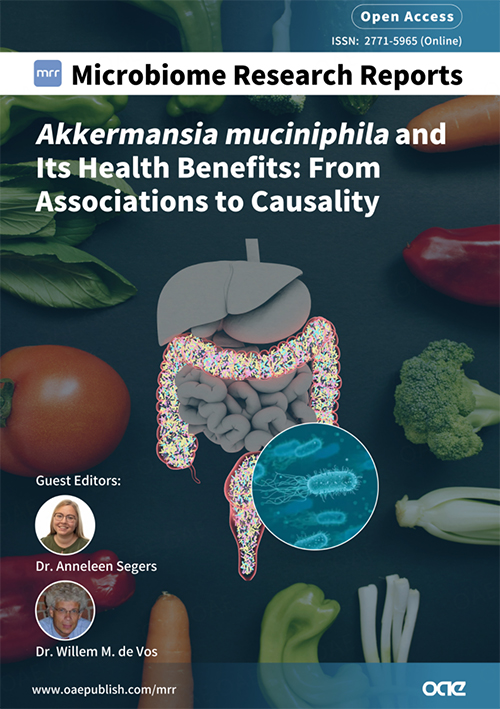
Topic: Akkermansia muciniphila and Its Health Benefits: From Associations to Causality
A Special Topic of Microbiome Research Reports
ISSN 2771-5965 (Online)
Submission deadline: 31 Dec 2024
Guest Editors
Dr. Anneleen Segers
Laboratory of Microbiology, Wageningen University & Research, Wageningen, The Netherlands.
Special Topic Introduction
Akkermansia muciniphila, a mucin-degrading symbiotic bacterium, has emerged as a significant contributor to gut health since its isolation from the human intestine in 2004. Extensive research has been conducted on this bacterium ever since. In healthy individuals, the colonic abundance of A. muciniphila ranges between 1%-4% and its abundance is inversely correlated with several diseases, such as inflammatory bowel diseases, obesity and type 2 diabetes. While high-fiber diets and polyphenol-rich foods have been found to increase A. muciniphila levels in the colon, there is limited understanding of the mechanistic aspects underlying this stimulation by dietary components.
By maintaining a healthy gut barrier, A. muciniphila controls immune responses and limits inflammation, a root cause of many diseases. Both live and pasteurized A. muciniphila administration can reinforce the intestinal barrier and counteract metabolic disturbances in both animals and humans. Importantly, pasteurized A. muciniphila is safe for human consumption, enabling its commercial use in weight gain management. In the understanding of A. muciniphila's mode of action, the pilus-associated signaling protein (PAS, Amuc_1100) has been identified as a pivotal component. PAS mediates many of A. muciniphila's health-promoting effects by activating Toll-like receptor 2 and enhancing barrier function. In addition, other secreted and outer membrane proteins such as P9, as well as metabolites such as short-chain fatty acids and cell envelope fragments, have been shown to have health-promoting effects.
This Special Issue aims to showcase publications that expand on the current knowledge about A. muciniphila to provide further mechanistic insights into its mode of action and identify causal relationships between A. muciniphila and its health-promoting effects. We welcome manuscripts presenting original research, reviews, perspectives, opinions and commentaries on all aspects of A. muciniphila and its health benefits, including but not limited to:
● Therapeutic potential and mode of action of PAS, extracellular vesicles or other extracellular components of A. muciniphila;
● A. muciniphila-host interaction mechanisms in health and disease;
● Mechanistic insights into the effect of dietary components on A. muciniphila's abundance and/or activity;
● Insights into the interaction between A. muciniphila and other members of the gut microbiota;
● Novel Akkermansia species and their therapeutic potential.
By maintaining a healthy gut barrier, A. muciniphila controls immune responses and limits inflammation, a root cause of many diseases. Both live and pasteurized A. muciniphila administration can reinforce the intestinal barrier and counteract metabolic disturbances in both animals and humans. Importantly, pasteurized A. muciniphila is safe for human consumption, enabling its commercial use in weight gain management. In the understanding of A. muciniphila's mode of action, the pilus-associated signaling protein (PAS, Amuc_1100) has been identified as a pivotal component. PAS mediates many of A. muciniphila's health-promoting effects by activating Toll-like receptor 2 and enhancing barrier function. In addition, other secreted and outer membrane proteins such as P9, as well as metabolites such as short-chain fatty acids and cell envelope fragments, have been shown to have health-promoting effects.
This Special Issue aims to showcase publications that expand on the current knowledge about A. muciniphila to provide further mechanistic insights into its mode of action and identify causal relationships between A. muciniphila and its health-promoting effects. We welcome manuscripts presenting original research, reviews, perspectives, opinions and commentaries on all aspects of A. muciniphila and its health benefits, including but not limited to:
● Therapeutic potential and mode of action of PAS, extracellular vesicles or other extracellular components of A. muciniphila;
● A. muciniphila-host interaction mechanisms in health and disease;
● Mechanistic insights into the effect of dietary components on A. muciniphila's abundance and/or activity;
● Insights into the interaction between A. muciniphila and other members of the gut microbiota;
● Novel Akkermansia species and their therapeutic potential.
Submission Deadline
31 Dec 2024
Submission Information
For Author Instructions, please refer to https://www.oaepublish.com/mrr/author_instructions
For Online Submission, please login at https://www.oaecenter.com/login?JournalId=mrr&IssueId=mrr2412311563
Submission Deadline: 31 Dec 2024
Contacts: Fiona Yin, Managing Editor, [email protected]
Louise Xu, Assistant Editor, [email protected]










